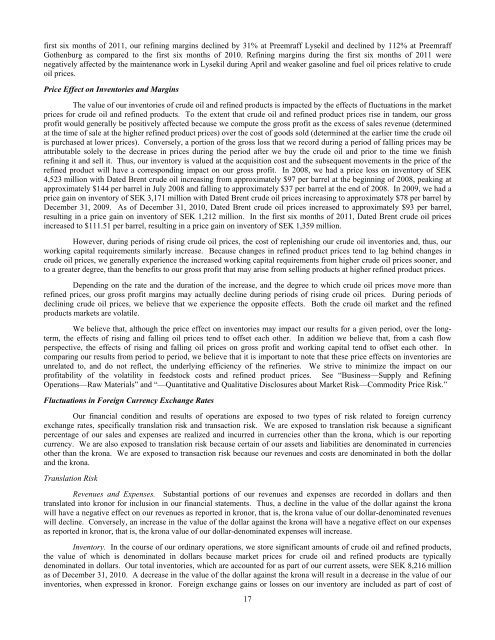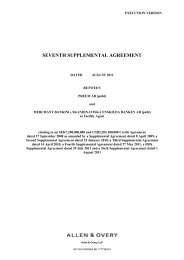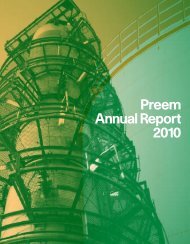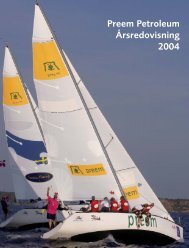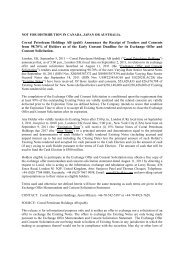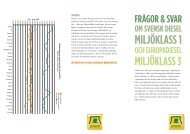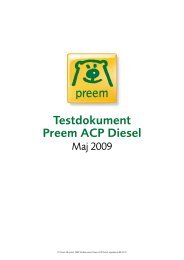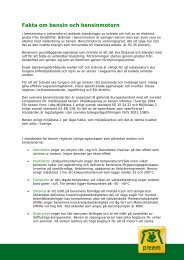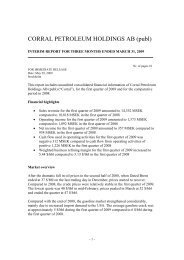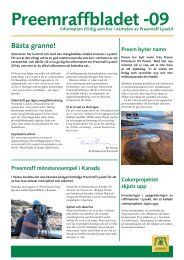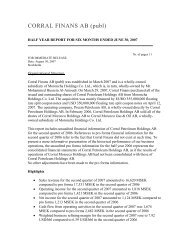Corral Petroleum Holdings AB (publ) Business Update ... - Preem
Corral Petroleum Holdings AB (publ) Business Update ... - Preem
Corral Petroleum Holdings AB (publ) Business Update ... - Preem
Create successful ePaper yourself
Turn your PDF publications into a flip-book with our unique Google optimized e-Paper software.
first six months of 2011, our refining margins declined by 31% at <strong>Preem</strong>raff Lysekil and declined by 112% at <strong>Preem</strong>raffGothenburg as compared to the first six months of 2010. Refining margins during the first six months of 2011 werenegatively affected by the maintenance work in Lysekil during April and weaker gasoline and fuel oil prices relative to crudeoil prices.Price Effect on Inventories and MarginsThe value of our inventories of crude oil and refined products is impacted by the effects of fluctuations in the marketprices for crude oil and refined products. To the extent that crude oil and refined product prices rise in tandem, our grossprofit would generally be positively affected because we compute the gross profit as the excess of sales revenue (determinedat the time of sale at the higher refined product prices) over the cost of goods sold (determined at the earlier time the crude oilis purchased at lower prices). Conversely, a portion of the gross loss that we record during a period of falling prices may beattributable solely to the decrease in prices during the period after we buy the crude oil and prior to the time we finishrefining it and sell it. Thus, our inventory is valued at the acquisition cost and the subsequent movements in the price of therefined product will have a corresponding impact on our gross profit. In 2008, we had a price loss on inventory of SEK4,523 million with Dated Brent crude oil increasing from approximately $97 per barrel at the beginning of 2008, peaking atapproximately $144 per barrel in July 2008 and falling to approximately $37 per barrel at the end of 2008. In 2009, we had aprice gain on inventory of SEK 3,171 million with Dated Brent crude oil prices increasing to approximately $78 per barrel byDecember 31, 2009. As of December 31, 2010, Dated Brent crude oil prices increased to approximately $93 per barrel,resulting in a price gain on inventory of SEK 1,212 million. In the first six months of 2011, Dated Brent crude oil pricesincreased to $111.51 per barrel, resulting in a price gain on inventory of SEK 1,359 million.However, during periods of rising crude oil prices, the cost of replenishing our crude oil inventories and, thus, ourworking capital requirements similarly increase. Because changes in refined product prices tend to lag behind changes incrude oil prices, we generally experience the increased working capital requirements from higher crude oil prices sooner, andto a greater degree, than the benefits to our gross profit that may arise from selling products at higher refined product prices.Depending on the rate and the duration of the increase, and the degree to which crude oil prices move more thanrefined prices, our gross profit margins may actually decline during periods of rising crude oil prices. During periods ofdeclining crude oil prices, we believe that we experience the opposite effects. Both the crude oil market and the refinedproducts markets are volatile.We believe that, although the price effect on inventories may impact our results for a given period, over the longterm,the effects of rising and falling oil prices tend to offset each other. In addition we believe that, from a cash flowperspective, the effects of rising and falling oil prices on gross profit and working capital tend to offset each other. Incomparing our results from period to period, we believe that it is important to note that these price effects on inventories areunrelated to, and do not reflect, the underlying efficiency of the refineries. We strive to minimize the impact on ourprofitability of the volatility in feedstock costs and refined product prices. See “<strong>Business</strong>—Supply and RefiningOperations—Raw Materials” and “—Quantitative and Qualitative Disclosures about Market Risk—Commodity Price Risk.”Fluctuations in Foreign Currency Exchange RatesOur financial condition and results of operations are exposed to two types of risk related to foreign currencyexchange rates, specifically translation risk and transaction risk. We are exposed to translation risk because a significantpercentage of our sales and expenses are realized and incurred in currencies other than the krona, which is our reportingcurrency. We are also exposed to translation risk because certain of our assets and liabilities are denominated in currenciesother than the krona. We are exposed to transaction risk because our revenues and costs are denominated in both the dollarand the krona.Translation RiskRevenues and Expenses. Substantial portions of our revenues and expenses are recorded in dollars and thentranslated into kronor for inclusion in our financial statements. Thus, a decline in the value of the dollar against the kronawill have a negative effect on our revenues as reported in kronor, that is, the krona value of our dollar-denominated revenueswill decline. Conversely, an increase in the value of the dollar against the krona will have a negative effect on our expensesas reported in kronor, that is, the krona value of our dollar-denominated expenses will increase.Inventory. In the course of our ordinary operations, we store significant amounts of crude oil and refined products,the value of which is denominated in dollars because market prices for crude oil and refined products are typicallydenominated in dollars. Our total inventories, which are accounted for as part of our current assets, were SEK 8,216 millionas of December 31, 2010. A decrease in the value of the dollar against the krona will result in a decrease in the value of ourinventories, when expressed in kronor. Foreign exchange gains or losses on our inventory are included as part of cost of17


